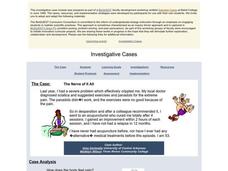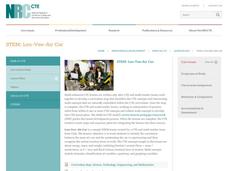Illustrative Mathematics
Price per Pound and Pounds per Dollar
Help learners understand the concept of unit rate as it is applied to buying beans at a grocery store. The objective is to determine the unit rate in two ways, and then apply each ratio to an additional problem. The attached commentary...
Illustrative Mathematics
Dividing by One-Half
Understanding when to divide by two or one-half can be confusing. Here is an activity that gives four different scenarios. It is up to your number crunchers to decide if they divide by two or one-half. The easiest way to approach the...
Illustrative Mathematics
What is a Trapezoid? (Part 2)
This collaborative activity investigates the meaning of a trapezoid and a parallelogram. It begins by presenting two different definitions of a trapezoid. Learners are to reason abstractly the difference between the two definitions and...
Illustrative Mathematics
Banana Pudding
Making banana pudding despite misplacing your one-cup measuring cup is easy as long as you can find your quarter-cup measuring cup! This real-life activity provides a good opportunity for learners to interpret division of a whole number...
California Academy of Science
Coral and Chemistry
Using cabbage juice as a pH indicator, future scientists explore the effect of increasing carbon dioxide on the pH of the ocean and relate it to the health of coral reefs. Ideal for an earth or environmental sciences course, this lesson...
California Academy of Science
Global Climate Change and Sea Level Rise
Ice is nice, and its condition on the planet has a significant effect. Junior geoscientists experiment with ice melting in both water and on land to discover how each affect the rising sea level. This detailed instructional activity...
California Academy of Science
Greening Your Middle School
Middle schoolers redesign their school to make it more energy efficient, and create a model of their design. Learners get together in groups of 5, and they take on the task of making their school more energy efficient. To do this, they...
Illustrative Mathematics
Battle Ship Using Grid Paper
You sank my battleship! The iconic cry of the time-honored game, Battleship will be heard in classrooms with this learning game that requires only grid paper, pencils, and an introductory knowledge of the first quadrant of the coordinate...
Judicial Branch of California
Separate But Equal - Is It Black or White?
The story of Ruby Bridges and the case of Brown vs. The Board of Education are fantastic tools for discussing the concept of separate but equal. Kids tackle some big questions about what is fair, what is civil, and what rights or laws...
Friends of Fort McHenry
Sensory “Star Spangled Banner”
Music can help us to access memories and events in a meaningful way, and Francis Scott Key used specific words to convey what he had seen and felt when writing what would become America's national anthem. Help your class connect to the...
Northwest Career & Technical Academy Foundation
Stand Up. . . Be InCtrl!
What is the difference between a bystander and an upstander? A collaborative project created through digital media helps the class understand that they can participate in an online community respectfully and responsibly. They consider...
Curated OER
A Whale of Importance to the Arctic People
The bowhead whale of the Arctic region is of great importance to the people that live there. Your class will brainstorm all they know about this wonderful whale and create an informational video, which they will share with the children...
National Research Center for Career and Technical Education
STEM: Lou-Vee Air Car
A comprehensive lesson on acceleration awaits your physicists and engineers! Two YouTube videos pique their interest, then sample F=ma problems are worked and graphed. The highlight of the lesson is the building of a Lou-Vee air car!...
National Research Center for Career and Technical Education
Finance: Depreciation (Double Declining)
Of particular interest to a group of business and finance pupils, this lesson explores depreciation of automobile values by comparing the double declining balance to the straight line method. Mostly this is done through a slide...
National Research Center for Career and Technical Education
Information Technology: Photoshop Scale
Scaling is a practical skill as well as a topic to be addressed throughout the Common Core math standards. You are given three different presentations and a detailed teacher's guide to use while teaching proportion, as well as practice...
Center Science Education
Paleoclimates and Pollen
Demonstrate for your earth scientists how plant pollen of the past has become part of sedimentary deposits, providing clues about ancient climates. Then give them simulated sediment layer samples to analyze for different types of paper...
Center Science Education
Model a Moving Glacier
Glaciologists in your class make models of glaciers to simulate how they move down a valley, and then they use it to test any aspect of glacier movement. Not only is this a vivid visual of how these monsters of ice flow, but it is also...
Center Science Education
CO2: How Much Do You Spew?
Split your earth science or environmental studies class into groups and give each a scenario card. Scenario cards describe the lifestyles of 10 different fictitious families, focusing on their energy usage. Carbon dioxide emissions are...
Center Science Education
Feeling the Heat
What is an urban heat island? Middle school meteorologists find out by comparing temperatures at different locations on campus. They relate their findings to what might be happening in a concrete jungle and how it impacts local weather....
Center Science Education
Looking Into Surface Albedo
How does the color of a surface affect the heating of the earth? Middle school science classes experiment with color and surface albedo to determine the relationship. The website has tabs for an overview, teacher's instructions,...
Center Science Education
Plugged In To CO2
Watt is going on here? Middle schoolers are learning about energy use and carbon dioxide emissions! In the first part of this instructional activity, learners measure how much energy different appliances consume and calculate the amount...
Center Science Education
Investigating the Climate
What do graphs of atmospheric gases over time show us? Do they indicate that carbon sources and carbon sinks are not in balance? Up-and-coming meteorologists watch video clips, read information, and analyze data from the HIPPO (HIAPER...
Center Science Education
Tracking Hurricane News
Here is a unique twist for your lesson on hurricanes. After examining extreme weather news headlines, your storm chasers view a PowerPoint about hurricanes and then zoom in on Hurricane Irene. They map a timeline of her trek up the East...
Center Science Education
Weather in the News
Tornadoes, blizzards, and hurricanes, oh my! In this instructional activity, meteorology majors compare stories of historical storms written by two or more different sources. As a result, they understand how the media portrays such...

























